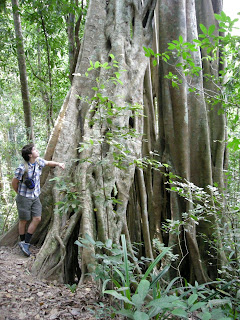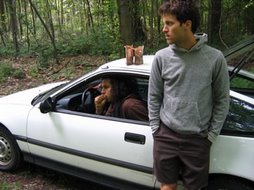
Before I describe my own experiences in Bangkok and Thailand, let's first turn to Murrary Head's description in his 1984 hit song "One Night in Bangkok":
Bangkok; oriental city –
But the city don’t know what the city has kept;
The crem de la crem of the chess world in a show with everything, but Yul Brynner.
Time flies -
Doesn’t seem a minute since the Tyrolean spa had the chess-boards in it.
All change –
Don’t you know that when you play at this level, it’s no ordinary venue:
It’s Iceland, or the Phillipines, or Hastings, or… or this place!
One night in Bangkok, and the world’s your oyster!
The bars are temples, but the bills ain’t free.
You’ll find a god in every golden cloister!
And, if you’re lucky, then the god’s a she.
I can feel an angel slidin’ up to me.
One town’s very like another one –
Your head’s down over your pieces, brother.
It’s a drag – it’s a bore to be lookin’ at the board, not lookin’ at the city.
Whaddaya mean?
You’ve seen one crowded, polluted, stinking town…
************
Get tied!
You’re talkin’ to a tourist whose every move’s among the purest.
I get my kicks above the waistline, Sunshine.
One night in Bangkok make a hard man humble!
Not much between despair and ecstasy.
One night in Bangkok, and the tough guys tumble!
Can’t be too careful with your company.
I can feel the devil walkin’ next to me.
Siam’s
Goanna be the witness to the ultimate test of cerebral fitness.
This grips me more than would a muddy old river or reclining Buddah.
Thank God I’m only watching the game – controlling it.
I don’t see you guys waging the kind of mate I’m contemplating.
I’d let you watch - I would invite you,
But the queens we use would not excite you.
So you’d better go back to your bars, your temples
…Your ‘massage’ parlors…
One night in Bangkok, and the world’s your oyster!
The bars are temples, but the bills ain’t free.
You’ll find a god in every golden cloister!
A little fresh, a little history.
I can feel an angel slidin’ up to me.
One night in Bangkok make a hard man humble!
Not much between despair and ecstasy.
One night in Bangkok, and the tough guys tumble!
Can’t be too careful with your company.
I can feel the devil walkin’ next to me.
My friend Tom and I began two days before Christmas --one of the busiest times for Korea-Thailand travel. Plane tickets can be cheap to Thailand and ours were especially cheap because our travel agent routed us through the Taiwanese city of Khaoisung for one night on each leg of the trip. Being someone who likes to cut costs, I thought it was a fine deal and assumed that Tom and I could cut corners even more by sleeping in the Khaoisung airport. American airports may be used to the sight of people strewn in various airport hideaways, waiting for an early morning flight, but Khaoisung was a well-organized city with a very small airport and an even smaller presence of foreigners. So when the security guards saw two dirty foreigners stretched across the floor and seats they didn't know quite what to do. We were asked for our passports and tickets multiple times and shuffled down to customer service and had an interesting evening of all sorts of these random, airport personnel encounters and various gifts given to us along the way, as they thought that we were too poor to get a hotel room. While we only spent 2 nights in the city, Khaoisung itself was a beautifully designed with wide streets, millions of motor bikes,a well-planned grid layout, and a seaside location. Walking around the city made me nostalgic for my trip through China in 2005 and made me remember the polite chaos of Chinese cities. I was very sad that we didn't have more time to spend in Khaoisung and the rest of Taiwan. But, flights are cheap enough that I might make a trip down there sometime in the spring.
Arriving into Bangkok on Christmas Eve was an odd movement between worlds: arriving into an ultra-modern, cephlopod-like airport with hundreds of rich tourists boarding through the most intense entry process I've ever had to go through; driving in a bus along a new highway with football-field-sized billboards and a view over Bangkok's outer-lying slums where people lived in shanties and cooked over outdoor fires; and the seedy tourist area that lies within the boundaries of the old city. Tom and I took a while to find a wonderful guesthouse and within a half an hour of putting our bags down and exploring the town we met the man who would haunt the remainder of our journey: a man we only now know as "the clock man."
He had five or six gold medallions on a chain that resembled clocks at first. and I wondered what a man could need with so many clocks and thought he was a bit suspicious. My next instinct was to figure out if each clock kept track of a different timezone, but later we found out that they are some sort of Buddhist pendants that Thai men occasionally wear. He told us that he was from a teacher in the north, educating the impoverished hill tribes that live outside the city of Chianmai, and that he had come to Bangkok to take a holiday and request more teaching materials from the government. We went to some of the main tourist temples and shrines within the old city together and then, checking another clock on his wrist, the man asked us if we wanted to go and have some Thai food and beer. These sorts of requests have become normal after living in Korea for 6 months and meeting old men on my hiking trips so we said yes and were ushered into a duk-duk (a motorized rickshaw) and driven a ways to an oddly placed bar that was outside of any sort of bar or restaurant district.
We were led into a dingy restaurant where large appliances were being auctioned off in one corner and girls were singing on stage. We were tricked into ordering Thai Brandy that was sold by the bottle and not by the shot and after drinking two bottles of it we discovered that we owed the man 4000 baht each, which totaled around $128. The man was banking on the fact that we didn't know the currency and while we did he, the creepy feeling we got from the restaurant he was probably hustling for, and our tendency to be overly culturally sensitive is what really lost us our money.
This put a damper on Christmas day but we still toured around the city throughout the day. While it may sound cool that a country has as many Buddhist temples as Thailand does, they lose your attention when you see the same sorts of gold plated shrines on every corner. The
Temple of Dawn though was a nice relief from all of this since it hadn't been refurbished recently and had a much different sort of design than the other temples scattered throughout Bangkok.


The night of Christmas day Tom and I rode a 14 hour train to the northern city of Chiang Mai. After dealing with the pollution and traffic-crammed street life of Bangkok, Chiang Mai's slower pace was a much welcomed relief. Much of the foreigner district was within the old city walls crumbling behind a moat that surrounds the city. Chiang Mai is supposed to have the most temples of any city in Thailand and while they grew monotonous just as Bangkok's did, there was something amazing about seeing tiny ones hidden back in street nooks and around bends in the road. Better than this were the make-shift shrines that people built themselves near their homes. And Chiang Mai had so many colossal trees that just rose up alongside these structures and were sometimes 10 of me around.

After two days of wandering around the streets Tom and I found my old roommate Brad and his girlfriend Caitlin, who are both doing the JET program in Japan and were also traveling through Thailand and Laos during their winter vacation. We visited a famous temple on a mountaintop with them and then went on a hike through a national park to huge old tree and a waterfall.



Tom and I took off in a bus through the mountains to the small town of Pai. It turned out to be less Thai and more hippie than anything else we had yet come across. It was bizarre to be seeing tons of falafel stands, watching a bunch of Israelis watch a alien documentary in English, and find more access to western goods than in Korea. This all alongside earthenware pots of boiling herb teas, chickens running around on the streets, and old decaying shrines laid aside in small courtyards off the main road. However interesting it was though, Tom and I both got sick on the bus ride to it and since we had only one night there we didn't get to see very much.
We took a train back to Bangkok and got on the wrong train to the beach, where we had hoped to spend our last day in Thailand. So instead we spent it on the banks of a pond in one of Bangkok's parks. The coolest thing about the place was the number of people doing aerobics in it. We caught our flight back to Taiwan the next day and spent new years eve picking up our baggage as it hit midnight and watched a documentary about a plane crash through the rest of the night.














